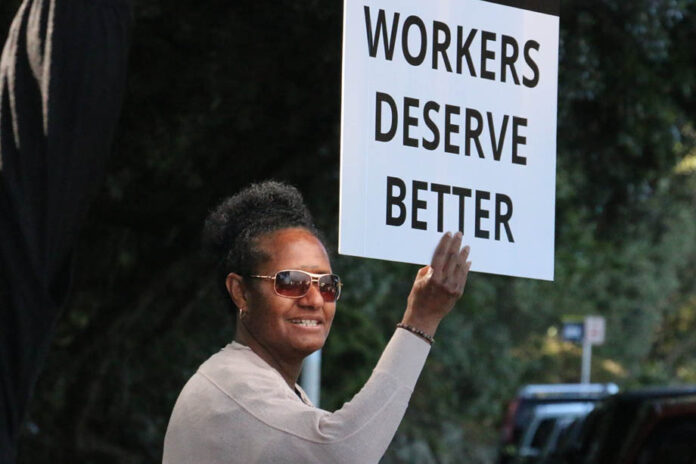Source: Etu Union
Thousands of care and support workers help sick, injured, and elderly New Zealanders live at home with dignity, but they are denied the pay, respect, and security of hours necessary to do the same.
Two unions represent these workers, the Public Service Association and E tū. Alongside Grey Power, they are calling for urgent government action to fix the broken sector. On the evening of Wednesday 14 April, support workers will gather at Parliament to discuss their plight with Ministers and MPs.
Despite years of promises and major reforms with various degrees of implementation, a landmark new study by AUT Business School confirms home support workers remain at the bottom of the heap in New Zealand’s public health system. They’re burned out, they don’t feel listened to, and they’re sick of it.
The current chaotic mess of competing provider companies, with fragmented funding from ACC, DHBs and the Ministry of Health, must be comprehensively overhauled and replaced with a nationally consistent funding framework that guarantees secure hours, breaks, paid travel time and safe workloads.
E tū delegate Jenny Stewart, who has been a homecare support worker for 14 years, says she feels the sector is “in crisis.”
“We are feeling very worn out and stressed a lot of the time. We feel that we don’t matter to anyone [higher up],” she says.
“We’re going out in our own vehicles, unseen – an invisible workforce. Home-based support is a vital service, but it relies on a workforce that doesn’t have proper job security.”
Despite milestones like the Equal Pay Settlement, guaranteed hours, and an in-between travel time payment, Jenny says few hours are actually guaranteed. Hours may not be not replaced if clients die or go into care, and insufficient travel reimbursement means insecure, low incomes. Many leave the sector for “more hours and more money”, she says.
Workers use their own cars, own mobile phones, and frequently work without breaks. Time allotted for client care is also being cut, Jenny says.
“We are subsidising the whole sector. The Government needs to look at the issue with eyes wide open. The demand for home-based support is going to grow and it needs to be sustainable.”
PSA delegate Donna Wealleans has worked in the industry for a decade, and she is tired of seeing improvements undermined in practice by systemic failures.
“Guaranteed hours haven’t worked out for a lot of support workers. Some of us can’t take time off, while others still can’t get the hours we need,” she says.
Donna worries high turnover and deep levels of stress among her colleagues have created a “ticking time bomb”, which will ultimately put the clients they care for at risk.
“New Zealand can’t afford this to continue when we have an ageing population and a lot more people will need support.”
“It doesn’t need to be this way, it shouldn’t be this way, but the system has not been properly organised and funded by the Government. That’s where the buck stops.”
Grey Power National President Jan Pentecost says client care is being sacrificed under the current model.
“The quality of care clients receive is dependent on the employment model for our carers, and carers cannot keep battling to survive in a sector which treats them, and their work, as expendable,” she says.
“Grey Power wants a home support system which allows people to stay healthy and safe at home, and ensures providers have sufficient numbers of fully trained staff, and relief staff, to meet their contracted case load at all times.”
ENDS



